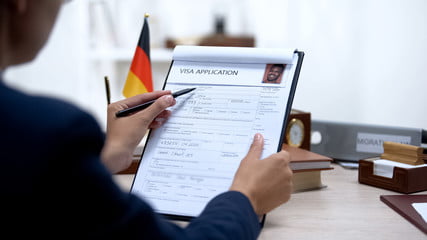July 27, 2020
How to Apply For German Job Seeker Visa- Guide for Foreign Job Seekers
By Kiran Peter
To fill the labor shortage of many sectors in Germany, predominantly in the health, manufacturing and IT sectors, the German federal government established a German National long-stay visa known as a Job seeker visa. A German job seeker visa entitles skilled and qualified immigrants to enter Germany, attend interviews and ultimately find a job of their choice. But job seekers are not supposed to work under a German job seeker visa.
Basically, with a German job seeker visa, you can reside in Germany for up to 6 months, and in the meantime seek a job in accordance with your education, experience and skill set. Upon completion of 6 months, if you have found a job, then you will be granted a Germany work permit or a Germany work visa.
Why Should You Settle in Germany?
- More opportunities for migrants, due to the shortage of skilled workers in different sectors.
- Germany is one among the world’s most livable cities
- Highest paying jobs, great benefits
- 2nd most popular migration destination, after the US.
- In the German job market, there are more than 1.2 million vacancies.
- When compared to other European countries, the cost of living in Germany is reasonable.
- Germany has a low unemployment rate, which is only 3.6%
Eligibility Criteria For German Job Seeker Visa
You are required to meet specific eligibility criteria in order to apply for a job seeker visa. It includes-
- Bachelor’s or master’s degree in STEM subjects( Science, Technology, Engineering and Mathematics), from a recognised German university or other equivalent foreign degree.
- Minimum 2 years of relevant work experience in your field
- Proof that you have adequate fund to cover the expenses while in Germany
- Proof of medical insurance that takes care of your health expenses in Germany

How can I get a job seeker visa in Germany?
German job seeker visa application process is quite similar to the application process for other German visas. You need to follow a few steps to apply for the visa-
Complete the Application Form
First things first, complete the online application form correctly and carefully and once done, thoroughly check the application. Print it twice and sign at the end of the application form.
Make an Appointment
As a next step, make an appointment with the German embassy/consulate located in your home country. Make an appointment as early as possible since the appointment may take up to 3 months. Before you show up in the embassy, check their website to find out their specific requirements.
Collect the Required Documents
Gather all the required documents. The documents required for German Job seeker visa are-
- Two duly filled visa application forms
- A valid passport
- Three passport photos
- Academic documents
- Proof of financial resources
- Proof of accommodation
- Proof of health insurance
- Cover letter
- Curriculum vitae

Proof of Health insurance
Note that it should be valid for 6 months, starting from the date of your arrival in Germany. The health insurance policy should cover you during the entire stay in Germany.
Proof of financial resources
You need to prove that you can meet your expenses while in Germany through any one of the following-
- A blocked bank account
- Bank statement
- A letter of sponsorship
Indeed, the most important part of the visa application is proving that you have sufficient financial resources. For that purpose, you need to open a blocked bank account, with a minimum of €853 per month and €10236 per year in your account.
Cover Letter
A cover letter is equally important as proof of financial resources. In your cover letter, you need to describe your objective of visiting Germany, and your plans to find a job, and your plans if you failed to find employment in Germany.
It’s extremely important to provide the documents in a translated form. The embassy may ask for extra documents. Suppose if you failed to meet the requirements of the German authorities, then your application is most likely to be rejected.
Attend the Interview
On the day of the appointment, show up at the embassy on time. They may cancel your appointment, even if you are behind time, for a few minutes. Make sure that you carry all the required documents along with you.
Pay the Fees
Pay the fees for German job seeker visa and a receipt will be issued to you.
Once you get a job, you need to convert your visa into an employment residence permit. Apply for an EU blue card or an employment residence permit.

EU Blue Card
In order to get an EU blue card, the annual gross salary specified in your job offer letter should be a minimum of 55,200 Euros. Suppose if you’re a specialist in fields such as engineering, mathematics, life sciences or IT, then it should be a minimum of 43,056 Euros. You can obtain a permanent residence permit, upon completion of 33 months with the EU blue card.
Employment Residence Permit
Mostly, your employer will sponsor you and if not, you can apply for the residence permit on your own immediately after you get a job. However, you can apply for the permanent residence permit only after more than 5 years stay in Germany. You can bring your family members to Germany through a Family reunion long term visa.
Soon after you arrive in Germany, you need to complete Address registration- After you arrive in Germany, within 2 weeks, you need to register your address at the registration office located in Germany. Locate a registration office near you and show up at the registration office with your documents regarding your address, passport and visa.
Frequently Asked Questions
- Is the German language mandatory for a German job seeker visa?
Proof of German language proficiency is not required for visa application. To qualify for the visa, English language proficiency is sufficient. You are not required to take any test for German or English( IELTS or TOEFL). However German language proficiency can help you attain a job easily.
- Is it possible to extend a job seeker visa, if you didn’t find a job?
No. The job seeker visa has a validity of 6 months, and if you failed to find a job, then you have to return to your home country. You should leave the country before the date of visa expiry. You can re-apply for the visa under the same process.
- How long will it take to get a German job seeker visa?
It generally takes nearly 4 to 6 weeks for an individual to get the visa. It takes a bit longer, specially for German national visas, since your application will be sent to the local immigration office located in Germany. But the processing time is conditional on how quick you are in submitting all the relevant documents.
- Do I need a German job seeker visa?
It depends on your nationality or citizenship. Nationals from EU, EEA and Switzerland can enter the country without a visa. Nationals from Canada, Japan, New Zealand, Australia, Israel, are also exempted from getting a visa. Residents of the rest of the countries need to apply for a German job seeker visa to enter Germany.
- Can I work with a German job seeker visa?
No. You are not supposed to work with a job seeker visa. After finding a job, you need to apply for a residence permit to work.
- What is the total cost involved in getting a job seeker visa?
The German job-seeker visa will cost you €75. This fee is subjected to change, and the fee can’t be reimbursed if your visa gets rejected.
Other Blogs
3
Feb

How to Qualify for Germany’s Opportunity Card: Eligibility Criteria Explained
Germany’s Opportunity Card offers skilled professionals an easier way to live & work in Germany. Learn about the eligibility criteria, points system, and more.
28
Jan

Why Choose German Public Universities for Your Master’s Program?
Discover why German public universities are ideal for a Master's: world-class education, tuition-free programs, vibrant culture, and excellent career prospects!
2
Jan

Germany’s Opportunity Card: A Game Changer for Skilled Professionals
Germany's Opportunity Card offers skilled professionals a simplified path to live and work in Europe's strongest economy, no job offer needed.


